“Favor the Bold”
Written by Ira Steven Behr & Hans Beimler
Directed by Winrich Kolbe
Season 6, Episode 5
Production number 40510-529
Original air date: October 27, 1997
Stardate: unknown
Station log: The Defiant is adrift and venting plasma, with shields at 30% and no weapons. Two Jem’Hadar ships fire on them—and then the Rotarran decloaks and destroys one ship while the Defiant powers up shields and weapons and destroys the other. The decoy worked.
They’re both then recalled to Starbase 375, yet another retreat after an engagement. Dax rants at Sisko about how this constant retreating is killing morale, and they need a big victory. Sisko then announces to Dax that he’s planning one: he’s presenting a plan to Admirals Ross, Sitak, and Coburn to retake Deep Space 9. Ross is on Sisko’s side, but Sitak and Coburn are skeptical. Sitak is concerned about the resistance they’ll face, and Coburn is worried that they’re leaving Earth vulnerable. But Sisko points out that control of the wormhole is too important. The Dominion will defend that territory at all costs.
Starfleet Command eventually agrees, but the plan relies on having a fleet of Klingon Defense Force ships, and Gowron is unwilling to commit that many vessels. Martok and Worf travel to Qo’noS to plea to the chancellor personally, on the theory that an ally he respects (Martok) and an enemy he despises (Worf) both telling him the same thing will convince him to accede.
Quark and Kira try to go see Odo to confront him about Rom’s imprisonment, but his quarters are guarded by a Jem’Hadar and a Bajoran security guard. The Bajoran apologetically explains that Odo gave strict instructions not to be disturbed by anyone until the female changeling leaves his quarters. Of course, she hasn’t actually left his quarters any time in the past three days…
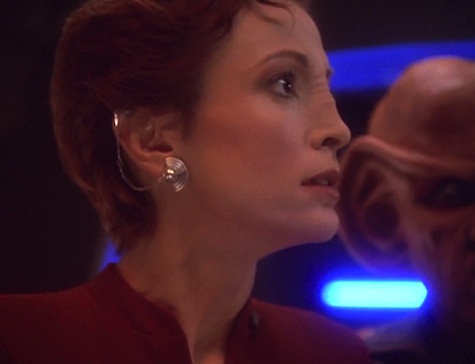
Inside, we discover that Odo and the female Founder have had sex in the manner of humans and Bajorans, which the latter has found endlessly fascinating and enlightening. Proving he’s not totally gone, Odo refuses to discuss his regrets about not having copulated with Kira, not even with the female changeling, while she—having been separated from the Great Link for months—appreciates how alone Odo must be without it.
Odo also is shocked to learn that three days have passed without his realizing it. But the female changeling dismisses his worries, as the solids’ concept of time and schedules is no concern of his.
Kira goes to Weyoun to plead on Rom’s behalf, hoping that the fact that he’s married to a Bajoran citizen would help, but Weyoun is adamant that he not only stay imprisoned, but be executed, not only for his sabotage, but because he’s the one who came up with the self-replicating mines in the first place.
Quark and Leeta visit Rom, who is pretty fatalistic about his impending doom, but Quark is determined to free Rom somehow. But Rom doesn’t want to be freed, he wants Quark to finish his sabotage.
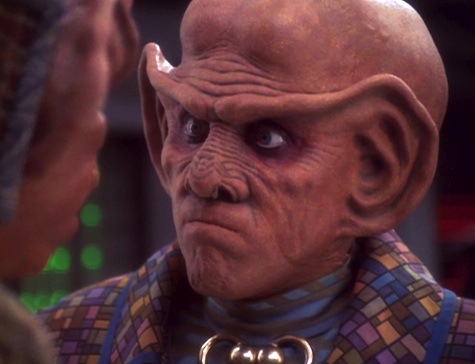
Kira talks to Ziyal for the first time in weeks, asking her to plead to Dukat on Rom’s behalf. Ziyal tells Dukat that it’s a chance to show the Bajorans that he’s the forgiving, compassionate person he insists that he is, not the monster the Bajorans view him as. Dukat’s response is to ask if Ziyal was in any way involved with Rom’s sabotage, which doesn’t thrill Ziyal, and she storms out when Dukat makes it clear that enemies of the state must be punished.
Once again, Quark is able to loosen Damar’s tongue with kanar, and he finds out that the minefield will be down in a week. They need to warn Starfleet, and a method is provided by Jake: Morn is going to visit his mother for her birthday, and he is taking an ecrypted message to Sisko—which now will include a warning about how soon the minefield will be down. Upon receiving this intel, Ross approves of Sisko going ahead with the attack, even though they have neither the Ninth Fleet (they’re a day behind) nor the Klingons (no word from Martok and Worf yet).
Damar reports to Weyoun and Dukat that two of Starfleet’s fleets have broken off from the front and converged on Starbase 375. Dukat then orders a very reluctant Damar to talk to Ziyal and convince her to talk to Dukat again. When Damar finds her, she’s with Kira and she refuses to go. Damar tries to appeal to her sense of loyalty (they need to present a united front to the Dominion lest their new allies turn on them), and when that doesn’t work he tries an insulting form of gratitude (he should’ve left her in the Breen prison, but he didn’t, he took pity on her, and she should be grateful, dagnabbit), and when that doesn’t work, he just grabs her to force her to go, at which point Kira beats the crap out of him.
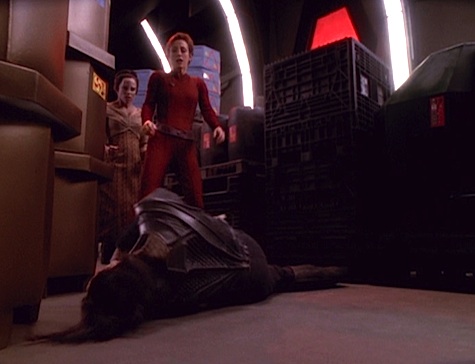
Nog has been promoted to ensign, and he thanks O’Brien for all he’s taught him. Sisko and Garak also board the Defiant, and Sisko once again takes command, leading a huge-ass fleet of Starfleet ships toward the Bajoran sector.
Dukat gets Weyoun’s permission to divert ships from the front lines to defend the station against Starfleet, and then a bruised Damar informs Dukat that his attempt to get Ziyal to talk to her father failed rather dismally.
Odo and the female changeling stand at Jake and Nog’s old spot overlooking the Promenade. Odo sees solids so much differently now, and the female changeling makes a comment about breaking them of their silly little dependence on freedom. When Odo looks askance at that comment, the Founder dismisses it as the imprecision of verbal communication, and then dismisses Odo so she can talk to Weyoun. For his part, Odo seeks out Kira and makes a truly pathetic attempt to apologize, but Kira angrily points out that they’re way way past “sorry.”
The fleet proceeds to DS9, though eleven ships have had to break formation to repair battle damage that wasn’t totally fixed when they embarked. O’Brien detects a fleet heading toward them that outnumbers them two to one. Sisko orders an attack formation, and to battle they go.
To be continued…
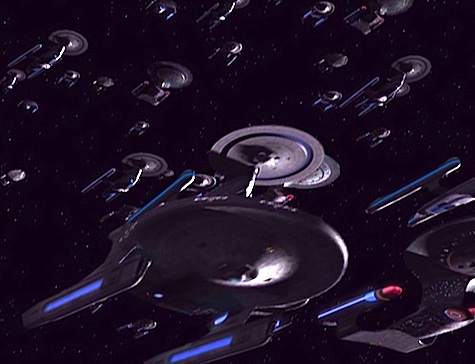
The Sisko is of Bajor: At one point, Sisko waxes rhapsodic on the subject of Bajor to Ross, announcing that he intends to purchase land there and build a house. Even if he’s assigned somewhere other than DS9 in the future, home will be Bajor.
Don’t ask my opinion next time: Busy episode for Kira, who gets to appeal to Weyoun, conspire with Quark and Jake, beat the crap out of Damar, and yell at Odo.
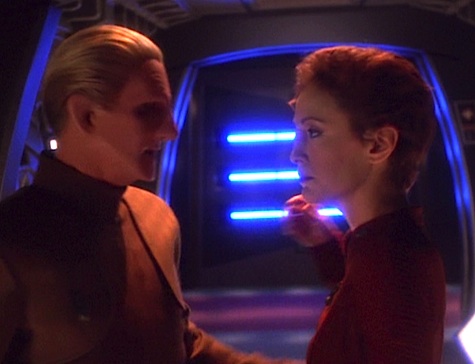
The slug in your belly: Dax’s rant to Sisko at the beginning is hilarious, referring to “you brass hats at Starfleet Command,” and referring to herself as a simple field officer.
Preservation of matter and energy is for wimps: Weyoun assumes that the female changeling’s seduction of Odo is to neutralize him as a threat to the war effort, but the Founder doesn’t care about that, she just wants Odo to return to the Great Link, which is the most important concern for the Founders. (Neutralizing Odo’s threat to the war effort is just a fortuitous side effect.)
Rules of Acquisition: Quark has asked the Grand Nagus to buy Rom’s freedom, though that’s not really how the Dominion does business (so to speak), and at one point, Quark hires five Nausicaans to break Rom out, but Kira convinces him that that’s a bad idea. (Quark wonders if he can get his money back from the Nausicaans…)
Plain, simple: Garak is convinced that Starfleet Intelligence has put a neural implant to read his thoughts in his brain, mainly because that’s the sort of thing he would’ve done when he was with the Obsidian Order. And he’s generally not pleased at being interrogated by SI, as he likes being the interrogator better.
Victory is life: The Founders bred the Vorta to have no sense of aesthetics and weak eyesight, but superb hearing.
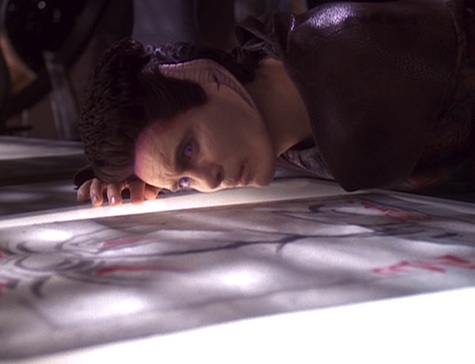
No sex, please, we’re Starfleet: Odo and the female changeling have sex in the manner of humanoid solids. The number of levels on which that is wrong are far too numerous to count…
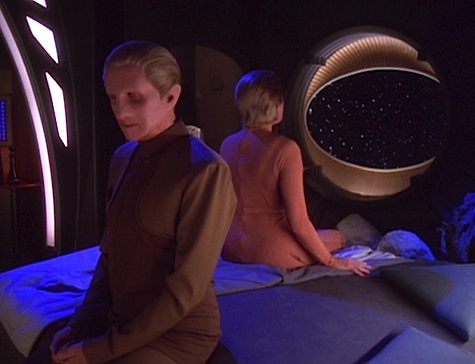
Keep your ears open: “Can you believe it? They made me an ensign.”
“I didn’t realize that things were going so bad.”
“Scary, isn’t it?”
Nog and O’Brien discussing the former’s field promotion.
Welcome aboard: There are eleven guests listed in this episode, and they’re all recurring regulars: Marc Alaimo, Casey Biggs, Jeffrey Combs, Aron Eisenberg, Max Grodénchik, J.G. Hertzler, Barry Jenner, Salome Jens, Chase Masterson, Andrew J. Robinson, and Melanie Smith. In addition, Bart McCarthy and Ericka Klein play the two admirals, Coburn and Sitak.
Trivial matters: The original plan was for the Dominion occupation of DS9/Terok Nor to be a four-episode arc, but as they were breaking stories, they decided to make it five episodes. And then when they got to the retaking of the station, they realized they had too much for a single hour and so expanded it out to this and “Sacrifice of Angels.”
The title derives from Book 10 of Virgil’s The Aeneid, “audentes fortuna iuvat,” general translated as “fortune favors the bold.” Sisko quotes the line at the end of the episode.
The character of Admiral Coburn was named after actor James Coburn, whose character in the movie Midway poses a similar objection to Admiral Nimitz, because it would leave Hawai’i vulnerable. Of course, Coburn’s concerns are not entirely unwarranted—the Dominion will eventually make a strike on Earth, as we’ll see in “The Changing Face of Evil.”
Nog gets a field promotion to ensign in this episode, which means that he outranks both O’Brien and his father. O’Brien had lamented in “Facets” that he was eventually going to have call Nog “sir,” and that day has come sooner than expected thanks to the war.
The female changeling’s statement that the Founders consider getting Odo to return to the Great Link to be of greater import even than conquering the Alpha Quadrant will play a part in how the war ends in “What You Leave Behind.”
Among the ships in the fleet are the Cortez and the Sarek. The former is presumably named after the conquistador who conquered Mexico for the King of Castile in the 16th century (the episode’s co-writer, Hans Beimler, was born in Mexico City). The latter is named after the Federation ambassador and father of Spock who appeared in the episodes “Journey to Babel,” “Yesteryear,” “Sarek,” and “Unification I,” as well as five of the feature films.
Sisko will fulfill his promise to himself to buy land on Bajor in “Penumbra.”
Walk with the Prophets: “Earth isn’t the key to the Alpha Quadrant—the wormhole is.” The perfect first part of a second parter, this has everything coming together and building to a slam-bang conclusion. The tension is thick and taut throughout the episode, as the storm is coming…
But that’s not what makes the episode shine. No, it’s the little character moments.
First we have Quark, who is willing to do anything he can to save Rom. However, since this is Quark we’re talking about, “anything he can” mostly involves spending money, whether his own (on the Nausicaan thugs) or Zek’s (the Grand Nagus’s offer to buy Rom’s freedom). He’s unwilling to actually complete Rom’s sabotage. (Plus, y’know, he doesn’t have anything like the technical skill…)
Then there’s Damar. We actually learn quite a bit about Damar. That celebratory kanar last time wasn’t an isolated incident. He comes out and says to Ziyal that he doesn’t trust the Dominion for a second when he urges her to help present a united front so that their new allies don’t smell weakness and strike. Damar generally carries the air of someone who doesn’t want to put up with anyone who gets in the way of his serving Dukat, whether it’s Weyoun, Kira, or Ziyal. Indeed, his head is so far up Dukat’s ass his nose is sticking out of Dukat’s belly button.
We also walk back Odo’s betrayal a bit as he starts to come out of his little fugue state and realize just what’s going on around him. The first step on the road back to himself is realizing that he totally lost track of three days. Then there’s the female changeling’s little line about breaking the solids of their reliance on freedom. It’s the first misstep in the female changeling’s seduction of Odo, though it comes from a place of honesty. The Founder’s motives are pretty transparent: she wants Odo back. But she isn’t about to change who and what she and the other Founders are, and Odo finally begins to remember exactly who and what that is.
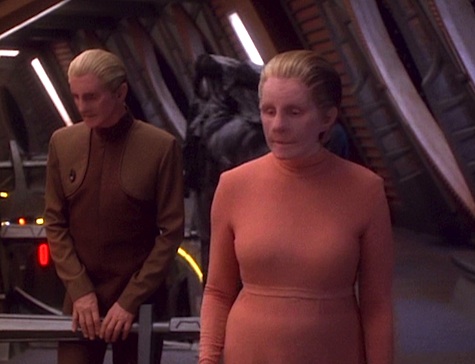
Meanwhile, Kira is working every angle she can, trying to plead with Weyoun, work with the Council of Ministers, smuggle messages to Sisko (you gotta love that Jake’s the one who comes up with a way to get a message out, and it’s basically via his being a friendly, chatty person), end her self-imposed avoidance of Ziyal to get her to appeal to what passes for her father’s better nature, and making sure to take the time to yell at Odo and beat the crap out of Damar for good measure.
Not every character beat works as well as others. Nog’s promotion to ensign is a cool thing, though it seems a bit like a writer’s trick to keep the character around, Sisko’s eloquent singing of Bajor’s praises seem a bit out-of-left-fieldish, Weyoun spends the entire episode talking in exposition about the Vorta and it’s really obvious (seriously, it’s like he’s reading off statistics from his character sheet), and Garak probably should’ve had Bashir check his head, not for a neural implant, but a device that forced him to speak in irritating clichéd platitudes. (“I hope for the best but expect the worst”? That’s really the best that Garak of all people can come up with?)
Still, an exciting beginning and middle, just waiting for the end…
Warp factor rating: 7
Keith R.A. DeCandido will be at Dragon Con 2014 next weekend. His full, and rather insane, schedule can be found here. Note that he’ll have copies of many of his books, among them The Klingon Art of War and Farscape: The War for the Uncharted Territories, with him for sale at the convention.










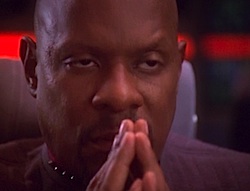
Good that they included Sitak as an admiral. I recently determined something very disturbing about the 24th-century Trek shows: Every admiral they ever featured was human except for three onscreen Vulcans (including Sitak), a fourth Vulcan mentioned in dialogue, and a Bolian Academy commandant in “Paradise Lost.” And except for Admiral Savar in TNG’s “Conspiracy,” the nonhuman admirals were all from DS9. The only other nonhuman flag officers we’ve ever seen in canonical Trek, as far as I’m aware, were the Andorian and Caitian extras in the Council chamber scenes in The Voyage Home. It is really, really disquieting that Starfleet’s highest echelons appear almost devoid of nonhumans in the 24th century. It’s an imbalance we’ve tried to address in the novels.
Anyway, the main thing that stands out for me here is how brave Rom was. And how annoyed I still am that the battle fleets had so many Galaxy, Miranda, and Excelsior ships and never a Sovereign or Intrepid. Although I think I see a few Akiras in the background in that shot. Which is something, except I think the Akira is really ugly.
@1 I know what you mean … Between Wolf 359, First Contact, and the war so far, you’d think there would be far fewer of the older ships by now…
@2 Especially the Miranda class and variants. Those are basically the redshirts of the starship world.
This is a brilliant episode and as highlighted it’s because of the characters. Rom in particular gets to shine and be the hero without ever not being the same bumbling guy. His progression through the series is one of the most interesting but close behind him is Demar. Others in the comments over the last few episodes have speculated that Dukat was taking his sweet time taking down the mines because he wanted to defeat the Federation and Klingons and then somehow throw off the Dominion. I don’t think he ever consciously thought that and Demar’s success with the field tests suggest he wasn’t slacking but it’s interesting that he is the one who puts the case across to Ziyal which openly acknowledges the dangerous game of getting in to bed with the Dominion.
As I said in previous comments I wish the Dominion had been on the station longer. There’s all these great snippets of characters and settings that we don’t have time to explore. From Mavek, the Cardassian who bought Kira coffee every morning to here where a Bajoran Deputy and a Jem’Hadar work side by side, I really wonder how that dynamic went.
@1: if Trek ever comes back as a TV series I wish to see a ship where humans are a minority in the Bridge Crew. An alien captain as lead is surely the next step. (I haven’t read many of the New Frontier books but they definitely took advantage of the prose and had a Command Crew where humans were in the minority, which I loved)
That title shot of Sisko is a little funny. Looks like he may have taken a little too much cold medication.
@1 I can see the issue, but it is reflective of what we’ve seen onscreen, where Starfleet crews are dominated by humans. I would imagine that you Trek lit writers have addressed this as well, with a number of single-species starships. The shows have from time to time, too, (well, at least once in “Take Me Out to the Holosuite”). I’m sure production costs play some part, though one does wonder how much it can possibly cost for Vulcan makeup, especially with how often they appeared on Enterprise or the wealth of more complicated alien guest stars in the later DS9 seasons.
And how annoyed I still am that the battle fleets had so many Galaxy, Miranda, and Excelsior ships and never a Sovereign or Intrepid. Although I think I see a few Akiras in the background in that shot. Which is something, except I think the Akira is really ugly.
@1
I actually think this was Rick Berman’s call not to put Enterprise E or Voyager models on DS9 battle scenes because it would somehow confuse viewers (which is still a serious case of underestimating your audience’s intelligence).
@1
Awww, I like the Akira. They really should’ve had more classes of ships out there though.
@2
About 40 ships were lost at Wolf 359, and First Contact had about the same number. This battle has about 600. I imagine most of the older ships would’ve been on routine patrol and exploration missions for the most part, not being called into battle for those earlier engagements or until the war actually started.
It occurs to me that with this episode taking place over 10 years after Farpoint, I’ve been considering Q’s past warnings to mankind.
Granted, Q was always a TNG creation, not as suited to DS9’s setting. But with the Dominion War raging across the quadrant, I can’t help but think this would be the perfect time for Q to once again comdemn humanity for being a grievously savage race. I imagine someone out there wrote a Q /Dominion War crossover in novel form.
Favor the Bold is all setup, but it really works, thanks once again to brilliant character work. By this point, it’s DS9’s biggest strength, and Ira and Hans mine it for all it’s worth.
Sisko’s eloquent singing of Bajor’s praises seem a bit out-of-left-fieldish
After everything that happened, I’m not sure I agree. If anything, his decision to buy a home and live on Bajor is a natural conclusion to everything he did and everything he went through.
@7
Which is strange in the former’s case since you’d expect the Enterprise to be involved in the war.
And apparently they changed their mind on the Intrepid in the next season. I guess they couldn’t pass up using those sets anymore.
Not really all that disturbing. It simply means alien captains are smart enough not to accept promotion. How many Badmirals have we seen? Too many. Something about it turns them evil.
@10: Using the Voyager sets was a matter of budget. They had a story set mostly on a Starfleet vessel, and building new sets would’ve been expensive, but Voyager‘s sets were right there, ready to use. (And they’d already reused the Defiant sets as another ship in “Valiant.”)
@11: I think that if aliens saw a bunch of human admirals turning evil, it would raise some serious questions about whether humans should even be allowed to be admirals.
What with? I thought that people in the Federation were not supposed to have any money?
@1: Are we sure all those Admirals were human? The Star Trek universe has a lot of alien races that are pretty much indistingushable from humans, so maybe some of those Admirals were Risians or Betazoids or Deltans or Angosians.
#12
Maybe so, and I’d like to see more aliens in Starfleet too. I just wish Trek writers would give up the old incompetent and/or corrupt high official trope for awhile. It’s tiresome.
@1: There are also Saber and Steamrunner-class ships in the fleet. I agree that it would have been nice to see some other classes (e.g., Ambassador, Sovereign, Intrepid, Wolf 359 classes), but even so, the effects guys did a terrific job throughout the Dominion War depicting the scale of Starfleet.
The Centaur-class had already been introduced prominently in “A Time to Stand”. Later in Season 6, they added a Nebula-class CG model. And as was already noted @10, in Season 7, we did finally get to see another Intrepid-class ship.
@13: Citizens of the Federation don’t need money to survive, because it’s a post-scarcity, replicator-based economy. That doesn’t mean they aren’t allowed to have or use it. It’s just optional.
@14: Few of the admirals in question were nameless. I suppose it’s possible that some aliens could have human-sounding surnames (like, oh, Spock, Troi, Dax, etc.), but there’s little doubt that someone named Quinn or Nakamura or Fitzpatrick or Hayes was meant to be human.
Kira beats Damar like he is Odo’s doorbell.
I really like the deputy outside Odo’s quarters. It’s another example of how DS9 seems like a big place, at least sometimes. You know that guy has some interesting stories, having to work side by side with the Jem’Hadar. He just sells the role so well in his few minutes on screen.
I sometimes think DS9’s biggest storytelling innovation was having a genuinely decent Admiral as a recurring character.
Also, I cannot express how excited I am that the “Weyoun & Dakar Show” is almost ready to premiere – best comedy duo in the Alpha Quadrant.
@1
Or the producers didn’t bother to make more nonhuman admirals because it would have meant spending more for makeup and effects.
@20: But DS9 had no trouble populating the Promenade and Quark’s with plenty of alien extras on a regular basis. And there were plenty of recurring alien characters on the various shows. If they could have Gowron or Dukat or the Borg Queen or Ambassador Soval show up on a recurring basis, they could’ve given us a few more alien admirals.
@5: Agreed, I always wanted to see a main protagonist ship with an alien captain. Not TOO alien; still relatable and embracing Federation ideals. Maybe Andorian, Denobulan, or Bolian.
@9: I like the theory that Q was secretly actually trying to give the Federation a needed kick in the pants in terms of military and technological innovation, by making them meet the Borg, so that they wouldn’t just get curb-stomped when they did eventually meet the Borg and the Dominion.
@11: I like it.
@19: A recurring admiral who’s reasonably competent, honorable, and not incredibly annoying? Blasphemy!
… I think a 7 is pretty generous for this episode. Mostly because it’s all just buildup, with no resolution of anything high-stakes. But also because I kinda wanted Kira to beat the crap out of Odo the way she beat the crap out of Damar.
From Douglas Adams’ original radio script for The Hitch-Hiker’s Guide to the Galaxy concerning the Haggunenons who, owing to their highly unstable and impatient chromosomes, constantly evolve into different lifeforms:
During her conversation with Odo on the promenade, I keep expecting the Female Changeling to refer to ‘filthy rotten stinking samelings’ and am always slightly disappointed when she doesn’t.
Does this make me a bad person?
Y’know who else was disappointed she didn’t say ‘filthy rotten stinking samelings’? *Hitler*
@21: where do they get it, though? Does the federation citizen amble up to the First Galactic Bank and ask for a zillion credits, with the reply of ‘okay’ and an immediate transfer (or… conjuring up) into their PayGoogBook account? Or do they use gold-pressed latinum like everyone else? Where do they get that? Other space-nations that still dabble with capitalism? What do they trade for it? Or do they manufacture it themselves? And all for what, in a post-scarcity society? To trade right back to capitalistic factions, for something… scarce? It can’t all be for buying retirement villas on Bajor, which in itself would be something scarce.
I can’t help but think it’s a bit more complicated than waving a couple of bars of GPL around and saying ‘I have it. I spend it. Ain’t no thang.’
@17, rather. Mr. Bennett, in any case. ;)
(Also, yes. I liked this episode. I hope you’ll forgive me if I didn’t find Damar’s beatdown particularly convincing though, unless he’s been on the kanar again.)
@24: I assume they get money the same way anyone does: By exchanging goods or services of equivalent value. Just because it’s no longer necessary for basic survival doesn’t mean it’s ceased to function as money. If you could just manufacture it for free in any quantity, then it would not functionally be money at all, it would just be paper or metal. Which is why counterfeiting is illegal.
We’ve been told since TOS that the Federation has credits as a monetary unit, which suggests an economy based on electronic funds, not so different from the way we handle so much of our money today with credit cards and automatic bank transfers. It seems reasonable to assume that Federation citizens can still earn credits as compensation for work that they do or products and services that they provide — it’s just that they do those things by choice rather than risking homelessness and starvation if they lack sufficient wealth. Maybe there’s a certain quantity of credits provided as a baseline to all Federation citizens to ensure they won’t be deprived of basic needs.
The problem that Jake Sisko had when it came to “not having money” was that presumably not every foreign government accepts Federation credits. Latinum is valuable because it’s non-replicable and thus counterfeit-proof, so it’s the one physical form of currency that can be universally accepted as being of value. So that would make it the preferred form of currency for commerce between different nations and societies. It should be kept in mind that what we see in DS9 represents the frontier, the interface between the Federation and the alien cultures around it, rather than everyday Federation life.
Quoth Warren B: “(Also, yes. I liked this episode. I hope you’ll forgive me if I didn’t find Damar’s beatdown particularly convincing though, unless he’s been on the kanar again.)”
What weren’t you convinced by, exactly? Yes, Casey Biggs is a lot bigger than Nana Visitor, but if you don’t think a small woman can beat up a bigger man, I want to introduce you to several of the women in my dojo. *laughs* Kira’s spent her life fighting, and while she likely doesn’t have formal hand-to-hand training (I doubt any formal training was available in the resistance), she knows how to hold her own in such. Damar does probably have such training, of course, though for him it was an obligation not a requirement to survive (which makes a difference), with the added bonus of him not taking Kira seriously as a Bajoran.
—Keith R.A. DeCandido
Not that, exactly. I’ve seen plenty of depictions of women beating up men that are convincing (thankfully I haven’t seen many real-life examples of anyone beating up anyone else), and I don’t sneer at training and experience. Th0ugh that’s part of it: it seemed like typical Trek fighting – some awkward shuffling and standing around, waiting for the clasped-hands blow to land. The rest is that, yes, Damar’s a big, chunky, military Cardassian. It’s not that he got clobbered by a *gurl* (and especially not Kira, who’s one of my favourite characters in DS9), but clobbered so thoroughly right off the bat. So unless he wasn’t completely sober, I think Damar got… worfed.
Maybe I’m misremembering. I’ll find out soon enough – the episode’s on SyFy UK right now as part of the ‘viewers’ top 30 Trek episodes’. No idea which place it came, though.
Well okay, looks like he stood up long enough to get one swing in!
@28 But Damar is not exactly Cardassian Military. He was Cardassian freighter crew. He has been Dukat’s adjudant and aide since Dukat went pirate. He may very well not have had a lot of real up close and personal fighting experience. And as you point out, he is a habitual drunkard.
Looking back, it’s interesting how important Damar’s alcholism ended up becoming to his arc and the conduct of the war for the season and a half.
Interesting article about the economics of the ST universe. Not sure I really agree, but it’s certainly intriguing.
@@@@@ 5. I agree. :) I heard noise of Michael Dorn petitioning for a Worf as Captain” return to tv for Star Trek. :)
@26
Except they explicitly claim not to use it or have it any more. Several times. But if Sisko is not being paid by Starfleet, where did he get the money to buy the farm from?
Kira was able to beat Damar up so thoroughly because she got the drop on him with the element of surprise — he wasn’t expecting her to escalate to physical violence over Ziyal. And then after she got the first hit in, the others just kept following before he could recover from being stunned.
Of course, none of this precludes the possibility that he was also a little drunk. That would be perfectly believable.
@34: Maybe Starfleet issues a gold pressed latinum ration to its members stationed in non-Federation territory in order to help promote crew morale and good relations with the locals. That would still be consistent with the Federation not really having money since the GPL would have little value back in Federation space, while explaining how Starfleet members are able to purchase goods and services on DS9 and Bajor.
(And it’s not like most Bajorans would charge the Emissary that much, so if Sisko saved up his GPL ration for a bit, he should easily be able to afford some good real estate.)
I agree. :) I heard noise of Michael Dorn petitioning for a Worf as Captain” return to tv for Star Trek. :)
@33
That has as much potential for happening as the Captain Sulu Excelsior TV series that George Takei pitched in the 1990’s. Mainly a vanity project that has zero chance of being taken seriously.
Maybe there’s a certain quantity of credits provided as a baseline to all Federation citizens to ensure they won’t be deprived of basic needs.
@26
It’s probably a more idealized and less buggy version of the welfare system we have today. In order for it to work, people really have to put the needs of others ahead of their own. So, the evolved sensibility speech from Picard still applies.
And the notion that other worlds might not accept Federation credits makes the most sense. In Star Wars, plenty of Outer Rim worlds rejected Republic credits, hence why Qui-Gon couldn’t buy a hyperdrive motivator.
@34
Except they explicitly claim not to use it or have it any more. Several times. But if Sisko is not being paid by Starfleet, where did he get the money to buy the farm from?
From the link I posted above:
I suppose it could be that most Federation citizens have access to credits, essentialy gifted by the Federation, but few opportunities to actually spend it within the Federation itself. Most people work because they choose to and in a field because it interests them, not because of pay. The key to it all is power production, and the anti-matter power plants produce more than can even be used, so running stuff like replicators for food, housing (that is a little tricky if you want a *specific* apartment in a *specific* area) is no problem as there is more than enough livable space on any planet-plus space structures which get mentioned-and transporters make it trivial to commute between New York and New Delhi. Heck I bet if you wanted your own spaceship the only criteria would be that you sat an astro-navigation exam and then they replicated one right off the line for you. What can cash actually buy? Hand-crafted “art” pieces, historical pieces, some cafe-diner hand made stuff (although I bet there are those who just love cooking so much that they don’t charge).
Essentially it is barter for a lot of stuff in that you just have to convince the previous owner/maker to let you have it. Money is meaningless because the fixed values that underline our monetary system are not fixed within the Federation.It would take more effort to actively ration resources than it would to create most of them. Of course that is all within the Federation itself. Leave the Federation and things will get tricky, but I could imagine the Federation having a sort of grant system for people like Sisko who want to buy a place on a non-Federation world. Just for most people that is a thing that is worthless.
The Federation itself is right on the border of scarcity-post scarcity economics. A little bit of a nudge in terms of spread and tech and it would be in The Culture territory.
The problem is not just that the Federation has been stated to not use money, but they have also been preening moralistic jackasses in explaining it. The question is not could Sisko have currency to make a purchase, but when, how and where a career Starfleet officer would have a chance and more importantly, the ambition to acquire enough to make a purchase of land on a planet that still has a currency based economy. Perhaps Starfleet does give its people a per diem when stationed outside of the Federation but it probably would not be enough to save much. Given the supposed cultural lack of interest in money I doubt you could not do that in the Federation core worlds and I doubt Starfleet would smile on an officer running a side business in other nations.
Hang on, I’ve worked it out. Sisko is currently in a relationship with Kasidy Yates, and she is a freighter captain employed by the Bajoran Commerce Ministry. He can get a loan off of her, possibly to be repaid in kind!
Sisko is the freakin’ Emissary. I’m sure he can have as much land on Bajor as he wants (and is available, though I’m sure some would happily give The Emissary their land). Plus, it can’t be too much land. It seems he only wanted enough for a nice house.
Can we take a moment to mention how awesome Morn is? For a character who never utters a single word on-camera, he casts a huge shadow on the entire series.
There is a simpler explanation to how and why credits work- we don’t see the civilian side of the equation, only the Star Fleet side where you can get anything you want out of a replicator. If you’re a civilian, there is probably some sort of minimum level of food, housing, clothing and other necessary items provided by the Federation government. If you want anything above and beyond that- say a nice suit or a piece of art- you have to pay. You’re still getting paid (probably in credits) which you can then spend however you want., but if you have no job you aren’t homeless and hungry, but you can’t have nicer things. Otherwise what’s the motivation for anyone working at all? It’s not just “for the communal good.”
Then again there is evidence to suggest that the system doesn’t always work perfectly. Look at New Paris (the colony that Tasha Yar comes from) it is apparent that the minimum standard of living thing didn’t quite work out given how that colony devolved, and the fact that apparently the Federation just let it happen. So it could also be that the Federation may have high ideals and works most of the time, but that it still isn’t paradise…
@44 – moment taken! Long live Morn!
@45: “Otherwise what’s the motivation for anyone working at all?”
Self-fulfillment and enrichment. For instance, if I didn’t have to work for a living, I’d still be a full-time writer, because it’s what I love doing. Anyone who had a creative talent like writing or art or music would be totally free to devote their lives to it, and not have to worry about selling out to make a buck or struggling to balance it with a day job.
Also, I’ve had the idea that in a highly automated, post-scarcity society, where people no longer had to work to produce physical goods and so forth, most labor would be in the care industries — child care, education, medicine, and the like. Those will always need the human touch. And it makes sense that a utopian society like the Federation would be a society in which everyone had access to excellent education and care throughout their lives, because that kind of upbringing would help ensure that people grew up well-adjusted and positive in their outlook. Especially if the people who did it were doing it as a labor of love rather than just to make a buck. Although there would probably be a salary in credits as an extra reward for the effort.
The thing is, if people didn’t have to work for a living, the only jobs they’d give up would be the drudge jobs that machines would take over doing anyway. Anything that people did for love of the work, for the challenge and sense of accomplishment, would still be done.
@45:
For the personal good, which sometimes goes with the common good. No one becomes a nurse or a soldier for the money after all, they do it because they want to contribute. The money just allows them to pay the bills while they do so. Take away the need to pay bills, and most will continue to serve regardless. It isn’t just that, I know someone who works in a shop, she loves it. She actually is independently wealthy and has no reason to work in that shop, but it makes her feel like she is contributing something. There is this other person I know, he builds boats. Now we are not talking huge great things, we’re talking small ones between ten and 20 feet. Single mast, small cabin, sort of thing. He has never sailed one, and he has never sold one. He just loves building them, gives them away to charities to use in the raffles. His actual job is a rather depressing office based one (I know he is depressed by it, he’s told me) and he only does it because it pays the bills and allows him to build boats. I tell you something to, there is no job no matter how disgusting, gross, or boring, that someone would not flat out love to do. To quote the movie “A Matter of Life and Death”:
Money does not drive these people. It doesn’t drive me either, it is just a depressing necessity. However what money does do is allow a certain type of status ranking. That is one of the reasons Conservative types like it so much, it is an easy way to keep score of who is worth more in the(ir) world. The post-scarcity singularity is going to be exceptionally hard for those sort of people to navigate, because you can no longer stand on a soapbox and say such-and-such person has only done X work and therefore is only deserving of Y amount of money (and therefore status). Its going to be a lot more fluid. It takes a lot of faith and imagination to conceive of that new world.
As for Tasha’s colony. It voted to secede. Why should the Federation force them to stay if they don’t want to? It isn’t like the United States, where once you are in, you are locked in forever more. In the rest of the world they follow the more enlightened policy of self-determination. In a little less than a month one of America’s oldest allies, the United Kingdom, may cease to exist simply because on of its constituent countries is voting on where to secede. This follows all of the UK’s Empire voting for the same. New Paris colony voted to secede, voted to go their own way, and voted with their feet to stay instead of leaving when its independence came. They people left behind are like the Maquis, they are no longer Federation citizens, they have to make their own way in the cold harsh universe. Don’t for a moment think that if they asked for help or readmittance to the Federation that it would be denied to them. The Federation welcomed Tasha with open and warm arms, giving her a senior position on its flaghship starship after all. And Tasha’s sister and friends were just as welcomed, until they stabbed the Enterprise in the (metaphorical) back. New Paris Colony wanted to “Go Galt”, and the Federation respected their determination to do so.
I really enjoy my job and would probably do it without pay – but at the same time, there are times I really appreciate the bonuses and perks because it does take a lot of time away from my family at certain times. So it’s good to be compensated for that (not that money is a subsitute for family, but at least we can sock it away for a family vacation together), and we’re also lucky that my husband stays home with the kids and that we can afford that. But I suppose our crazy work ethic/schedule is another thing that wouldn’t be such an issue in a post scarcity world because there would be enough workers that you wouldn’t have to work 12 hours.
Anyway, one thing that kind of hit me in this episode was Weyoun’s lack of aesthetics. I found it very sad and really felt pity for him during that scene. And of course female changeling’s esxpression of the various ideas of the Dominion and the place of solids made my skin crawl…ick.
One other thought – as much as I want Rom to be free, I can’t say I disagree with Weyoun or Dukat here when they try and get him freed. Technically, he WAS committing an act of sabotage, regardless of his marriage to a Bajoran. Actually, if that had somehow resulted in him being freed, it would have kind of irritated me on the principle of the thing.
While I have been hoping for Ziyal to come to an understanding about her father, this didn’t seem like the right place for it.
It’s a bit baffling that the Cardassians still think they just can get rid of the Dominion once they “conquered the Alpha quadrant”. They DO see how many ships they can get “for reinforcement” while ALSO maintaining control over the Gamma quadrant, right?
I always figured Weyoun was just yanking the Cardassian’s chains when he claimed to be unable to see them succeeding. Am I alone in that or did people think it was actually in earnest???
Lockdown Rewatch.. a scene setter of an episode but an enjoyable one. I forgot how much I enjoyed Weyoun until doing this rewatch, his genuine interest in trying to figure out what art actually is I found really interesting amongst all the other excellent character pieces mentioned in the main review. My one irk was Lita and that silly noise she makes when Rom talks about his execution, I think it was meant to be funny? It wasn’t.
The Founder’s line about the “solids’ concept of time for too long…you’re a changeling. You’re timeless” made me think about how much Sisko struggled to explain the concept of time to the Prophets way back in Emissary; I don’t think it was necessarily trying to suggest a relationship or even a contrast between the Prophets and the Founders, but it made me think about it.
The “bringing [Odo] home, returning him to the Great Link, means more to us than the Alpha Quadrant itself” has bothered me. Is that feeling true of all (most, the majority) of changelings? Was that always the case, or something that changed after the judgment that turned him into a solid (why not punish him “in” the Great Link? Or keep him chained on the planet where the Great Link is with it just inches away?) Even if they planned to eventually restore his abilities (perhaps they wanted to feel how he felt after he experienced the Great Link only to have it taken away; I don’t remember why they didn’t seem to do much after he regained his powers on his own), did they really think that starting a war/invading the Alpha Quadrant was going to help them in that goal or was an effective use of their resources? Even if they just assumed they’d win, why would that necessarily result in Odo returning (assuming he survived) instead of rejecting the entity that destroyed the places and people for whom he cared?
Other than knowing he’s in the show’s credits, is there anything that makes Odo so particularly special? Or would they have started a war/done whatever they believed was necessary to get any of the 100 “infants” sent out or even any random changeling who went for a stroll? Why didn’t they come and rescue the young changeling that gave Odo his powers back when it died?
Plus, how many changelings have already died in this war (I remember the fake ambassador, Martok , and Bashir)? How many had to temporarily leave the Great Link to engage in sabotage (there’s the Romulan with Tain, O’Brien says there’s only a few on Earth – though I imagine there’s more now and more on other planets, etc.)? I can understand the idea of a Saving Private Ryan kind of mission where it’s “worth” risking/losing multiple people to save 1 person (even if there isn’t necessarily something super-special about this person, like her being the heir to Winterfell or being the only who can come up with a technobabble way to save the day), but an inter-quadrant war that risks (let alone actually costs) other changelings doesn’t seem to be the “orderly” way to achieve this goal.
Finally, is it even true? If Odo agreed to return but asked them to leave the AQ/Bajor/whatever alone, do you really think they’d just sit idly by while we kept our chaotic quadrant right on the other side of the wormhole to their perfect order? If their version of Bashir’s geniuses concluded that the best way to preserve the safety of the Great Link was to conquer the AQ even if it might (or even if it certainly would) result in Odo not rejoining them, would the Founders avoid/stop the war? It doesn’t make sense for it to be a lie (she’s talking to Weyoun – who views her as a unquestionable God – and the audience), but, as rambled on above, their actions don’t make a ton of sense to me if it is true.
“did they really think that starting a war/invading the Alpha Quadrant was going to help them in that goal or was an effective use of their resources?”
They didn’t start the war because of Odo. They’d been conquering other civilizations for millennia; this was just more of the usual. Finding Odo there was just an unexpected bonus, a new factor to take into account.
“Other than knowing he’s in the show’s credits, is there anything that makes Odo so particularly special? Or would they have started a war/done whatever they believed was necessary to get any of the 100 “infants” sent out or even any random changeling who went for a stroll?”
Again, they didn’t start the war because of Odo, but otherwise, yes; since they’re a communal species where all identities blend together, they would naturally see all Changelings as literal extensions of themselves and care about them just as deeply. The only special thing about Odo, presumably, is that he’s more resistant to returning, so that requires more effort to win him back.
(Although it still bugs me that DS9’s writers never addressed the ginormous contradiction in saying “No Changeling has ever harmed another” while showing them as perfectly content to abandon 100 of their infants to the hazards of space. I wish at least they’d said that the Hundred had been lost in some accident, or cast adrift like Moses or Kal-El at some point when the Link’s survival was in doubt.)
“Finally, is it even true? If Odo agreed to return but asked them to leave the AQ/Bajor/whatever alone, do you really think they’d just sit idly by while we kept our chaotic quadrant right on the other side of the wormhole to their perfect order?”
Yes, it is true, as we see in the series finale.